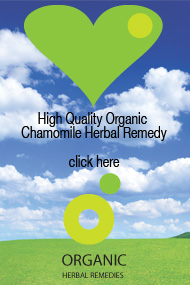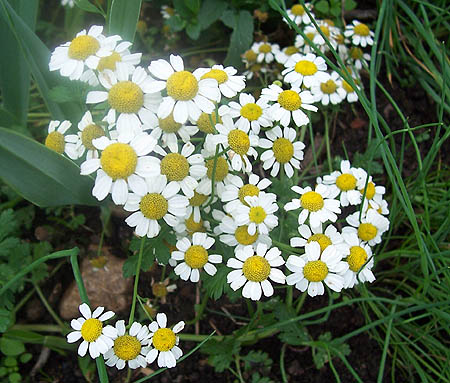Naturopathic health
Chamomile Research
Research on the Health Benefits of ChamomileChamomile has antibacterial, and sedative properties. As a cream it is also useful for treating eczema Allergies People should avoid chamomile if they are allergic to plants in the Asteraceae (Compositae) family. Examples include aster, chrysanthemum, mugwort, ragweed and ragwort. Chamomile tea has been reported to cause difficulty breathing, anaphylaxis (a severe allergic reaction) and allergic skin reactions in some individuals. Chamomile eyewash may cause allergic conjunctivitis (pink eye). Pregnancy And Breast-Feeding In theory, chamomile may act as a uterine stimulant or may cause abortion; it should be avoided during pregnancy. Chamomile is usually not recommended during breast-feeding, because there is not enough research in this area. Chamomile antibacterial and sedative propertiesHolmes et al (2005) found evidence that chamomile tea, a centuries old cure-all for all manner of ailments, may offer health benefits, including relief for cold symptoms and menstrual cramps. The article appeared in the January 26 issue of the American Chemical Society's Journal of Agricultural and Food Chemistry, a peer-reviewed journal. ACS is the world's largest scientific society. "This is one of a growing number of studies that provide evidence that commonly used natural products really do contain chemicals that may be of medicinal value," said study leader Elaine Holmes, Ph.D., a chemist with Imperial College London. "The healthcare industry is placing increasing emphasis on functional foods including natural remedies, yet little work has been conducted on the long term effects of such products on human biology." The herbal plant used in the study was German chamomile (Matricaria recutita), also known as manzanilla, whose flowers and leaves are brewed as a fragrant, flavorful tea. The study involved fourteen volunteers (seven women and seven men) who each drank five cups of the herbal tea daily for two consecutive weeks. Daily urine samples were taken and tested throughout the study, both before and after drinking chamomile tea. Increased Antibacterial ActivityThe researchers found that drinking the tea was associated with a significant increase in urinary levels of hippurate, a breakdown product of certain plant-based compounds known as phenolics, some of which have been associated with increased antibacterial activity. This could help explain why the tea appears to boost the immune system and fight infections associated with colds, according to the researchers. Drinking the tea also was associated with an increase in urinary levels of glycine, an amino acid that has been shown to relieve muscle spasms. This may explain why the tea appears to be helpful in relieving menstrual cramps in women, probably by relaxing the uterus, say the researchers. Sedating Effect of ChamomileGlycine also is known to act as a nerve relaxant, which may also explain why the tea acts as a mild sedative, Glycine supplements are sold for that purpose although naturopaths will usually recommend chamomile herbal tinctures or herbal teas.. Levels of both hippurate and glycine remained elevated for up to two weeks after the study participants stopped drinking the tea, indicating that the compounds may remain active for quite some time, according to the researchers. Additional studies are needed before a more definitive link between the tea and its alleged health benefits can be established, they emphasise. Further research has also shown that Chamomile cream can be useful in reducing the impact of eczema and other skin rash conditions Monographs ESCOP, the European Scientific Cooperative on Phytotherapy; E/S/C/O/P Monographs; 2nd Edition 2003; p. 312 ff. Research papers de la Motte, S., et al., "Double-blind comparison of an apple pectin-chamomile extract preparation with placebo in children with diarrhea," Arzneimittelforschung (1997), 47(11):1247-9 Kreysel HW. Study of Smoothing Effect of Camocare Cream on Skin Surface Damaged by UV Radiation. Dermatological Clinic and Polyclinic, University of Bonn, Germany. Kreysel HW. Study of Smoothing Effect of Camocare Cream on Skin Surface After Chemically Induced Damage. Dermatological Clinic and Polyclinic, University of Bonn, Germany. Kreysel HW. Study of Efficacy of Camocare Facial Therapy Compared With Leading Department and Drug Store Brands. Dermatological Clinic and Polyclinic, University of Bonn, Germany. Fidler P, Loprinzi CL, O'Fallon JR, et al. Prospective evaluation of a chamomile mouthwash for prevention of 5-FU induced oral mucositis. Cancer 1996;77(3):522-525. Kagawa D, Jokura H, Ochiai R, et al. The sedative effects and mechanism of action of cedrol inhalation with behavioral pharmacological evaluation. Planta Med 2003;Jul, 69(7):637-641. Kyokong O, Charuluxananan S, Muangmingsuk V, et al. Efficacy of chamomile-extract spray for prevention of post-operative sore throat. J Med Assoc Thai 2002;Jun, 85(Suppl 1):180-185. Maiche A, Grohn P, Maki-Hokkonen H. Effect of chamomile cream and almond ointment on acute radiation skin reaction. Acta Oncol 1991;30:395-397. Mazokopakis EE, Vrentzos GE, Papadakis JA, et al. Wild chamomile (Matricaria recutita L.) mouthwashes in methotrexate-induced oral mucositis. Phytomedicine 2005;Jan, 12(1-2):25-27. Patzelt-Wenczler R, Ponce-Poschl E. Proof of efficacy of Kamillosan cream in atopic eczema. Eur J Med Res 2000;5:171-175. Ross SM. An integrative approach to eczema (atopic dermatitis). Holist Nurs Pract 2003;Jan-Feb, 17(1):56-62. Rycroft RJ. Recurrent facial dermatitis from chamomile tea. Contact Dermatitis 2003;Apr, 48(4):229. Saller R, Beschomer M, Hellenbrecht D, et al. Dose dependency of symptomatic relief of complaints by chamomile steam inhalation in patients with common cold. Eur J Pharmacol 1990;183:728-729
|
Research homeHerbal remediesChamomile information
|
|
|
If you're starting to move towards a healthy diet and you want to take a major step forward then a detoxification programme can make a big difference. Click on the link below to find out more. Healthy Recipes Juicing SupplementsBach Flower Herbal Acupuncture Homeopathy DetoxificationMassage Qi Gong Nutrition & Diet Iridology Tissue Salts |

[Herbal Remedies][Ailments][Naturopathy][Contact][Community][Lifestyle][Home][Research]







